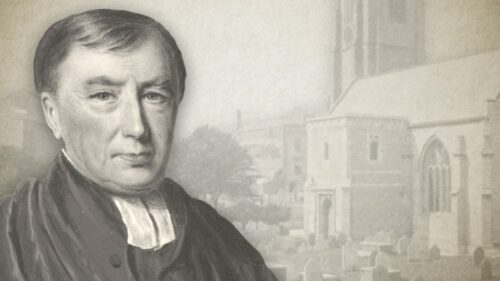
September 19—Morning Devotion
“I have set before thee an open door, and no man can shut it.”—Revelation 3:8
Blessed Jesus! thou hast indeed done all this, and more. Thou art thyself the door into thy fold here below, and to thy courts above; for thou hast said, by thee, “whosoever entereth in, shall go in, and find pasture:” and it is thou that hast opened a new and living way by thy blood. Thou art the only possible way of access to the Father. And because thou hast opened it, no man can shut it; for thou ever livest to keep the way, which thou hast once opened, still open, by thy all prevailing intercession. Yes, thou heavenly Lord, the gate is never shut, day nor night, in the preaching of thine everlasting gospel, all the ends of the earth shall see this salvation of our God. And, as thou hast graciously said, all that come to God by thee, shall never be shut out. The word, the authority, the warrant of Jehovah, is gone forth to this purpose. Thy blood and righteousness secure it. The Spirit sets his seal to it. Thou wilt receive, thou wilt bless, thou wilt cause all the Father hath given thee to come to thee; and thou wilt keep the door always open for all comers. Oh heavenly way! Oh precious, endless salvation! My soul, see to it that thou art entered in, and there abidest securely. Oh ye! my fellow sinners, yet without, rouse up from your carnal security and sloth, before the master of the house hath arisen and shut to the door; and ye then, too late, cry out, “Lord, Lord, open to us. Now is the accepted time; now is the day of salvation.”
Robert Hawker (1753-1827) was an Anglican (High-Calvinist) preacher who served as Vicar of Charles Church, Plymouth. John Hazelton wrote of him:
“The prominent features…in Robert Hawker's testimony…was the Person of Christ….Dr. Hawker delighted to speak of his Lord as "My most glorious Christ.” What anxious heart but finds at times in the perusal of the doctor's writings a measure of relief, a softening, and a mellowing? an almost imperceptible yet secret and constraining power in leading out of self and off from the misery and bondage of the flesh into a contemplation of the Person and preciousness of Christ as "the chiefest among ten thousand and the altogether lovely." Christ and Him crucified was emphatically the burden of his song and the keynote of his ministry. He preached his last sermon in Charles Church on March 18th, 1827, and on April 6th he died, after being six years curate and forty-three years vicar of the parish. On the last day of his life he repeated a part of Ephesians 1, from the 6th to the 12th verses, and as he proceeded he enlarged on the verses, but dwelt more fully on these words: "To the praise of His glory Who first trusted in Christ." He paused and asked, "Who first trusted in Christ?" And then made this answer: "It was God the Father Who first trusted in Christ."
Robert Hawker on the Biblical Covenants (Complete)
Robert Hawker's Poor Man's Morning Portions





